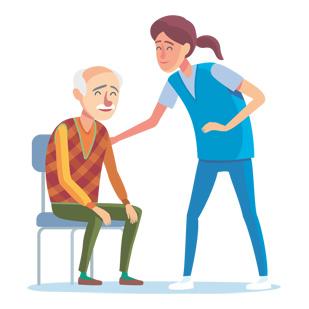You are here
Love and aggression
By Sara Mahdawi , Family Flavours - Oct 02,2022 - Last updated at Oct 02,2022

By Sara Mahdawi
Clinical Psychologist
We all experience bouts of anger and aggression, but dementia can exaggerate anger issues, even for people who previously had none. When caring for your loved one with dementia, here’s what you need to know about anger and aggression…
Behavioural changes are expected as dementia progresses, and these changes can be stressful. It’s normal to feel surprised, discouraged, hurt or even angry when someone with dementia lashes out at you for no apparent reason. Still, it’s also important to understand what provokes your loved one and how to respond.
Anger and aggression most likely develop in the middle stages of dementia, when patients start exhibiting behaviours such as yelling, throwing things, using foul language, physical aggression, or even trying to attack their caregivers.
Common causes
Picture the day through the eyes of someone livingwith dementia. Imagine someone you don’t know approaching you and telling you, “it’s shower time,”and then they undress you and you just can’t understand why someone is invading your personal space, forcing you to undress.
People with dementiamay not recognise their loved ones. This can cause fear, anxiety and aggression. They also might experience reality distortions. For example, a person may experience paranoia, delusions or hallucinations, leading to unexpected or unjustified behaviours. Moreover, dementia affects appetite and, in turn, poor nutrition can affect mood, energy and cognitive functionand fuel sudden outbursts for people with dementia.
Aggression triggers
Common triggers for people with dementia include:
Physical discomfort: It is not unusual for a loved one with Alzheimer’s or other dementia to be unable to tell you that they are experiencing pain or physical discomfort. Due to their loss of cognitive function, they can’t articulate or identify the cause of physical discomfort and may express it through physical aggression. Even the simplest reasons could cause aggression and anger, such as feeling tired or feeling hungry
Environmental factors: People with dementia tend to be overstimulated by loud noises, an intense environment, physical chaos, large crowds or being surrounded by unfamiliar faces
Tips for dealing with aggression and anger
Not rushing them. Don’t keep asking your loved one to do something faster, as it will only increase anxiety and stress and cause an anger outburst
Using cues. If you wish to help them with something, for example, washing their hands, show them by making a gesture with your own hands first
If what you are trying to help your loved one with is unnecessary, then don’t do it. You and your loved one need to choose your battles, not arguing with someone with dementia. It’s never helpful. Instead, give directions or listen.
Redirecting and distracting. Simply changing the conversation or setting may be enough to stop your loved one with dementia from an anger outburst.
Giving your loved one a little space. Their aggression may be because they feel their personal space is being invaded and don’t understand why
Have one-on-one Interactions. Some people with dementia feel devastated or threatened by having several caregivers. It may help to limit interactions to one person at a time. More than one person can increase anxiety and trigger aggression
Caring for a person with Alzheimer’s or relateddementia takes time and effort. Don’t forget to findtime to take care of yourself.
Related Articles
Several essential oils are proving effective for relieving symptoms of dementia, such as problems with memory, behaviour, mood and sleep. For someone with Alzheimer’s or other types of dementia, smell has the strongest and most direct connection to memory.
A fitful night’s sleep and a habit of daytime catnapping may be an early-warning sign of Alzheimer’s dementia, according to new research con
Family caregivers for dementia patients don’t sleep as long or as well as other adults of the same age, a new study suggests. In an ana

















